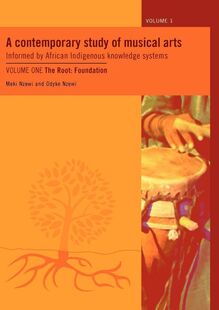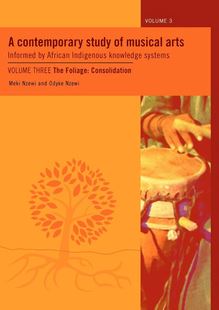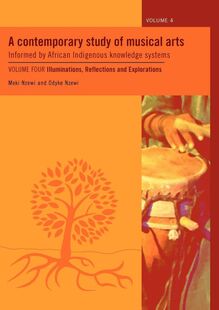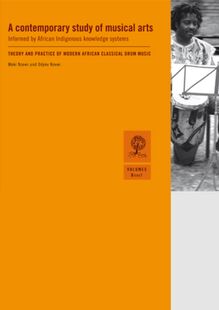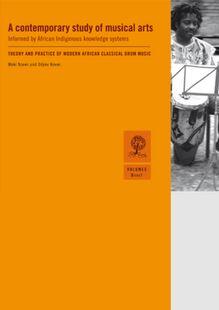-
 Univers
Univers
-
 Ebooks
Ebooks
-
 Livres audio
Livres audio
-
 Presse
Presse
-
 Podcasts
Podcasts
-
 BD
BD
-
 Documents
Documents
-
- Cours
- Révisions
- Ressources pédagogiques
- Sciences de l’éducation
- Manuels scolaires
- Langues
- Travaux de classe
- Annales de BEP
- Etudes supérieures
- Maternelle et primaire
- Fiches de lecture
- Orientation scolaire
- Méthodologie
- Corrigés de devoir
- Annales d’examens et concours
- Annales du bac
- Annales du brevet
- Rapports de stage
La lecture à portée de main
214 pages
English
A Contemporary Study of Musical Arts Informed by African indigenous knowledge systems: Volume 3 , livre ebook
214 pages
English
YouScribe est heureux de vous offrir cette publication

Description
Volume 3 – The Foliage: Consideration Modern literacy education in African music has hitherto focused more on observed context studies. The philosophical rooting and the psychological and therapeutic force that ground African indigenous musical arts have not been much discerned or integrated. Much needed in contemporary education, then, are integrative studies and literature materials that represent the intellectual base of the knowledge owners and creators, and which will ensure cognitive understanding of the indigenous musical arts systems of Africa.There is as yet no comprehensive, learner-centred book that fosters African indigenous knowledge perspectives and rationalisation about the musical arts. The concern over the years has been for the production of research-informed books for modern, systematic education in African musical arts that derive in essence from the original African intellectual perspectives about the sense and meaning of music – indigenous to contemporary.The five volumes of the musical arts study series derive from 36 years of research and analytical studies in African musical arts. The volumes address the pressing need for learning texts informed by the indigenous African musical arts systems that target tertiary education. The texts incorporate knowledge of conventional European classical music as they relate to the unique features of African musical arts thinking and theoretical content. The contemporary African musical arts specialist needs secure grounding in his/her own human-cultural knowledge authority in order to contribute with original intellectual integrity to African as well as global scholarship discourse and knowledge creation.
Sujets
Informations
| Publié par | African Minds |
| Date de parution | 22 mars 2012 |
| Nombre de lectures | 1 |
| Langue | English |
| Poids de l'ouvrage | 1 Mo |
Extrait
ACONTEMPORARYSTUDYOFMUSICALARTS INFORMEDBYAFRICANINDIGENOUSKNOWLEDGESYSTEMS
VOLUME3
THEFOLIAGE– CONSOLIDATION
Meki Nzewi
Ciimda series
A contemporary study of musical arts informed by African indigenous knowledge systems Volume 3
Author: Meki Nzewi Music typesetting & illustrations: Odyke Nzewi Reviewer and editor: Christopher Walton Copy editor: Hester Honey Proofreading: Chérie M. Vermaak Book design and typesetting: Janco Yspeert
ISBN 978-1-920051-64-8
© 2007 Centre for Indigenous Instrumental African Music and Dance (Ciimda) First edition, first impression All rights reserved
Production management: Compress www.compress.co.za
CONTENTS
I NTRODUCTION
MODULE 301:MUSICALSTRUCTURE,FORMANDTHECOMPOSITIONALPROCESSUNIT 1 –WE – LEMENTS OF COMPOSITION INDIGENOUS AND ESTERN CLASSICAL TOPIC 1 Seventh chord and inversions TOPIC 2 Minor scales TOPIC 3 Imitative entries TOPIC 4 Indigenous harmonic features TOPIC 5 Cadential and starting idioms TOPIC 6 Accidentals, modulation and transposition UNIT 2 –HINTSONORIGINALCOMPOSITIONANDARRANGEMENT TOPIC 1 Original composition TOPIC 2 Transcription and arrangement TOPIC 3 Openended composition
MODULE 302:FACTORSOFMUSICAPPRECIATIONUNIT 1 –C REATIVE LISTENING TOPIC 1 More exercises in matching melodies TOPIC 2 Improvising/extemporizing on a shared fundamental melody – the unilinear ensemble structure UNIT 2 –A III NALYTICAL PERCEPTION TOPIC 1 Aural reproduction and analysis – rhythm patterns TOPIC 2 Aural reproduction and analysis – melorhythmic statements TOPIC 3 Aural reproduction and analysis – melodies TOPIC 4 Aural reproduction and analysis – identifying intervals TOPIC 5 Hearing, spelling and identifying chords UNIT 3 –TECHNICALREPRODUCTIONOFRECEIVEDSOUNDIII TOPIC 1 Hearing, reproducing and writing rhythm statements TOPIC 2 Hearing, reproducing and writing melorhythmic statements TOPIC 3 Hearing, reproducing and writing melodies TOPIC 4 Hearing and writing intervals and chords TOPIC 5 Transcription techniques for multiple voices UNIT 4 –S ETTING TEXTS TO MELODY TOPIC 1 Composing with texts in local and foreign languages
VII
1 3 3 5 8 9 11 13 18 18 27 28
31 33 33
34 36 36 40 40 41 41 42 42 42 42 43 43 45 45
MODULE 303:MUSICINSTRUMENTSUNIT 1 –TRADITIONALENSEMBLETECHNIQUE TOPIC 1 How music instruments relate in an ensemble TOPIC 2 Practical ensemble experience as a learning process
47 49 49 57
MODULE 304:MUSICANDSOCIETY 59 UNIT 1 –THEINTERRELATIONSHIPOFTHEARTS 61 TOPIC 1 The synthesis of the creative and performance arts disciplines in indigenous music theory 61 TOPIC 2 Factors of musical intention and cognitive appreciation 64 UNIT 2 –INDIGENOUSDANCECONCEPTS 72 TOPIC 1 Free medley dance concept 72 TOPIC 2 Stylized formation (choreographed) dances 73 UNIT 3 –T 76 HE STRUCTURE OF AN INDIGENOUS FESTIVAL TOPIC 1 Features of festival preparation 76 TOPIC 2 Features of the core event 79 TOPIC 3 Features of the celebration events 81 TOPIC 4 Implications of the idea that informs a festival 82 UNIT 4 –THECONTEMPORARYMUSICSCENEINAFRICA 84 TOPIC 1 The nature and features of popular music 84 TOPIC 2 Comparative features of indigenous music, tradipop and modern pop music 93 TOPIC 3 Contemporary trends in musical arts creativity and practice in Africa 102
MODULE 305:RESEARCHPROJECTUNIT 1 –A PPLIED FIELD RESEARCH TOPIC 1 Summary of field research guidelines TOPIC 2 Guide for collecting, collating and analyzing field data TOPIC 3 Creative application of research data
MODULE 306:MUSICALARTSTHEATREUNIT 1 –R ’ E CREATING CHILDREN S MUSIC IN DRAMA AND MOVEMENT TOPIC 1 – Continued activities in stimulating creativity UNIT 2 –CLASSTHEATREPROJECTS TOPIC 1 Class production project: dramatization in mime or danced drama TOPIC 2 Class production project: improvised sketches – solo/duet/trio/quartet
111 113 113 116 120
123 125 125 127 127 128
MODULE 307:TECHNIQUEFORSCHOOLSONGSUNIT I –T HE MOUTH AS AN ORGAN FOR MUSIC MAKING TOPIC 1 The sound system of the musicmaking mouth TOPIC 2 Categories and styles UNIT 2 –E SSENCE AND NATURE OF MELORHYTHM TOPIC 1 The melorhythmic principle UNIT 3 –I NSTRUMENTS IN VOCAL MUSIC TOPIC 1 Vocalinstrumental textures UNIT 4 –E SSENCE OF MOVEMENT TOPIC 1 Integration of artistic disciplines UNIT 5 –GENERAL TOPIC 1 Cultural integrity in modern creative advancement
MODULE 308:PERFORMANCEUNIT 1 –STUDYOFSOLOANDACCOMPANIMENTINSTRUMENTS TOPIC 1 Specialization on an instrument or voice UNIT 2 –D ANCERS AND MUSIC DRAMATISTS TOPIC 1 Specializing as a dancer TOPIC 2 Specializing as a music dramatist
MODULE 309:AFRICANMUSICANDTHEHISTORICALPROCESSUNIT 1 –H ISTORICAL PROCESS IN INDIGENOUS MUSIC TOPIC 1 Definitions and methodology TOPIC 2 Conceptual foundations of indigenous music TOPIC 3 History of musical arts in a community TOPIC 4 History of indigenous musical arts styles TOPIC 5 History of musical arts personalities UNIT 2 –M USICAL DATA IN HISTORICAL RECONSTRUCTION TOPIC 1 Musical data in the history of human groups TOPIC 2 Dating of data in music history UNIT 3 –H ISTORICAL PROCESS IN CONTEMPORARY WRITTEN MUSIC TOPIC 1 The literary documentation process TOPIC 2 Stylistic trends in written classical African music TOPIC 3 General features of contemporary written compositions TOPIC 4 Makers of modern musical arts history in Africa TOPIC 5 The literati in African musical arts history TOPIC 6 Popular music in African musical arts history
129 131 131 133 136 136 138 138 140 140 142 142
145 147 147 149 149 149
151 153 153 155 164 166 168 174 174 175 176 176 178 184 185 187 188
MODULE 310:HISTORYANDLITERATUREOFEUROPEANCLASSICALMUSICUNIT 1 –PERIODSANDCHARACTERISTICS TOPIC 1 Periods of European classical music history TOPIC 2 Main characteristics of each period UNIT 2 –VOCAL/CHORALMUSIC TOPIC 1 Sacred choral forms TOPIC 2 Secular choral forms UNIT 3 –INSTRUMENTALMUSIC TOPIC 1 Solo instrumental forms TOPIC 2 Ensemble forms – chamber music TOPIC 3 Orchestral forms UNIT 4 –O PERA TOPIC 1 Development of European classical music drama and operatic forms UNIT 5 –THEGREATMASTERSOFEUROPEANCLASSICALMUSIC TOPIC 1 Short biographies
ADDENDUM TOPIC 1 Musical change, culture and identity TOPIC 2 Listening and analysis TOPIC 3 Perception of music in indigenous cultures
191 193 193 193 194 194 194 195 195 195 195 196 196 197 197
199 199 201 203
VUONLITU1ME 3
INTRODUCTION
The dry wood in a people’s environment cooks the food they need for nourishment. To understand others enriches one’s own. Igbo maxims
Need
Modern literacy education in African music has hitherto focused more on observed con-text studies. The philosophical rooting, the psychological and therapeutic force, and the humanning imperatives that ground African indigenous musical arts conceptualizations, theoretical-musicological content and contextual practices have not been much discerned or integrated. Much needed in contemporary education, then, are integrative studies and literature materials that represent the intellectual base of the knowledge owners andcreators, and which will ensure cognitive understanding of the indigenous musical arts systems of Africa. There is as yet no comprehensive, learner-centred book that fosters African indigenous knowledge perspectives and rationalization about the musical arts. The concern over the years has been for the production of research-informed books for modern, systematic education in African musical arts that derive in essence from the original African intellectual perspectives about the sense and meaning of music – indigenous to contemporary. Such books would enable discussion and research of the theoretical content, the philosophical and psychological foundations of creativity and practice, the nature and principles ofmusical arts theatre, and the historical process. The five volumes of the musical arts study series (the first three of which are progressive levels of study) address the pressing need for learning texts informed by the indigenous African musical arts systems that target tertiary education. The texts incorporate knowledge of conventional European classical music as they relate to the unique features of African musical arts thinking and theoretical content. The contemporary African musical arts spe-cialist needs secure grounding in her/his own human-cultural knowledge authority in order to contribute with original intellectual integrity to African as well as global scholarship discourse and knowledge creation. CIIMDA appreciates the collaboration of Professor Christopher Walton who reviewed and edited Volumes 1 and 2 of this series.
viii
ACONTEMPORARYSTUDYOFMUSICALARTS– VOLUME3
Background
The five volumes ofAcontemporary study of musical artsderive from 36 years of research and analytical studies in African musical arts – indigenous to contemporary. Sixteen years of practical research and advancement activities were undertaken in the Ama Dialog Foundation, Nigeria from 1983 to 1999. Subsequent research undertakings in southern Africa as a staff member of the Music Department, University of Pretoria, from 2000, with funding from both the National Research Foundation (NRF) of South Africa, and the Centre for Indigenous African Instrumental Music and Dance Practices (CIIMDA), funded by the Norwegian Foreign Office, have informed the series. The series further derive from my intensive creative and performance involvement in both indigenous and modern ensembles (modern African classical as well as popular), the teaching of African music, also thecreation (dialogue and composition) and production of musical arts theatre in tertiary institutions, as well as considerable practical education workshop activities (theory and practice of African drum ensemble music) in Africa and Europe.
A travelled mind gains more profound knowledge enrichment than a home-stuck mind, although a vague traveller (into other people’s knowledge systems) sheds sense of self. Igbo maxim
Research
Activities in some of the Modules in theA contemporary study of musical artsseries compel personal and group research as well as intellectual discourse. The essence of research is to stimulate self-mental illumination and intellectual growth, which will in turn contribute to knowledge advancement that will benefit the individual, others and humanity anywhere. Humanly research has always been the bedrock of African indigenous knowledge creations and advancements, and is essential for the construction and practice of the philosophy of humane living, globally, in contemporary times. The activities learning methodology em-phasized in these module series involves students in acquiring knowledge through personal research inquiry, participation and analysis of the known, that is the musical arts knowl-edge system within the students’ cultural imagination and realistic life experiences. The methodology adopted in the discussions, representations, interpretations and illustrations in the series has not been conceived to conform to the scholarly convention of literature survey and discourse as well as bibliographical shopping. This approach is for reasons of exigent redemptive cause direly needed in modern African scholarship environment. The concern is to focus without exogenous impositions and arguments on what is considered critical knowledge that expounds indigenous African intellectual authority, and which could help in forming original thinking among modern Africans in the contemporary scholarship emporium. The lecturers and the students are urged to conduct independent research for additional knowledge in the module themes, from field research as well as published and unpublished literature – books, manuscripts and documents available in accessible libraries
INTRODUCTION
and archives – needed to compare, dispute, substantiate, argue and expand the discussions in the book series. Hence we are concerned here with valid African indigenous epistemology rather than the discussion of published literature irrespective of perspicacity, substance or knowledge perspective.
We debase the moral foundation of our contemporary human systems when we de-value and de-virtue our indigenous musical arts systems.
Organization
The series is in five volumes designed for the study of the musical arts in the Music De-partments of colleges and universities in Africa in particular. The eight module titles for Volumes 1, 2 and 3 discuss the same knowledge concepts progressively as follows: Module 101/201/301 series – Music structure and form Module 102/202/302 series – Factors of music appreciation Module 103/203/303 series – Music instruments Module 104/204/304 series – Music and society Module 105/205/305 series – Research project Module 106/206/306 series – Musical arts theatre: The content is roughly the same for the three volumes on the rationale that productions in institu-tions of higher learning should involve all members of a De-partment of Music, working together as a production team, or in production teams, irrespective of year of study Module 107/207/307 series – School songs technique Module 108/208/308 series – Performance
Volume 3 has two additional modules: Module 309 – African musical arts and historical process Module 310 – History and literature of Western classical music
A module is sub-coded into unit themes developed as lecture topics that are broken down into steps of study. Volume 4 of the series is a collection of essays in indigenous music, dance and drama that could enrich perception on issues in musical arts scholarship for students and research-ers engaged in disciplinary specialization. It includes specialist discussions on dance and authentic African drama. Volume 5 is on modern African classical drumming as an instrument of specialization for contemporary concert performances. It contains repertory for solo drumming, drum and voice/saxophone/trumpet duos, and inter-cultural drum ensemble works. Some specific knowledge items recur across the volumes and modules to furnish addi-tional perspectives or explicatory insights. Volume 1 further takes into account the fact that education in the musical arts incontemporary Africa has been hitherto modelled on the mental and material resources of
ix
x
ACONTEMPORARYSTUDYOFMUSICALARTS– VOLUME3
European classical music. Most music students in Africa who are admitted to study music in tertiary institutions may be deficient in the borrowed theory and practice of Western music on which curricula are based, and may have no theoretical knowledge or practical experience at all of African indigenous music knowledge systems. Even for learners with an adequate background of European classical music education and practice, there is little awareness about the fact that strong theoretical formulae and philosophical issues inform creativity and performance in the African indigenous musical arts system.
A teacher who does not learn from interaction with learners is not an educator; A parent who does not learn from children at play is not an adult mind; Every person is born with the pristine genetic intelligence of a culture; the nature of upbringing nurtures or maims inborn knowledge.
MODULE 301 M , USICAL STRUCTURE FORM AND THE COMPOSITIONAL PROCESS
UNIT 1 – ELEMENTS OF COMPOSITION – INDIGENOUS AND WESTERN CLASSICAL TOPIC 1 Seventh chord and inversions TOPIC 2 Minor scales TOPIC 3 Imitative entries TOPIC 4 Indigenous harmonic features TOPIC 5 Cadential and starting idioms TOPIC 6 Accidentals, modulation and transposition
UNIT 2 – HINTS ON ORIGINAL COMPOSITION AND ARRANGEMENT TOPIC 1 Original composition TOPIC 2 Transcription and arrangement TOPIC 3 Openended composition
3 3 5 8 9 11 13
18 18 27 28
-
 Univers
Univers
-
 Ebooks
Ebooks
-
 Livres audio
Livres audio
-
 Presse
Presse
-
 Podcasts
Podcasts
-
 BD
BD
-
 Documents
Documents
-
Jeunesse
-
Littérature
-
Ressources professionnelles
-
Santé et bien-être
-
Savoirs
-
Education
-
Loisirs et hobbies
-
Art, musique et cinéma
-
Actualité et débat de société
-
Jeunesse
-
Littérature
-
Ressources professionnelles
-
Santé et bien-être
-
Savoirs
-
Education
-
Loisirs et hobbies
-
Art, musique et cinéma
-
Actualité et débat de société
-
Actualités
-
Lifestyle
-
Presse jeunesse
-
Presse professionnelle
-
Pratique
-
Presse sportive
-
Presse internationale
-
Culture & Médias
-
Action et Aventures
-
Science-fiction et Fantasy
-
Société
-
Jeunesse
-
Littérature
-
Ressources professionnelles
-
Santé et bien-être
-
Savoirs
-
Education
-
Loisirs et hobbies
-
Art, musique et cinéma
-
Actualité et débat de société
- Cours
- Révisions
- Ressources pédagogiques
- Sciences de l’éducation
- Manuels scolaires
- Langues
- Travaux de classe
- Annales de BEP
- Etudes supérieures
- Maternelle et primaire
- Fiches de lecture
- Orientation scolaire
- Méthodologie
- Corrigés de devoir
- Annales d’examens et concours
- Annales du bac
- Annales du brevet
- Rapports de stage
Signaler un problème
YouScribe
Le catalogue
Le service
© 2010-2024 YouScribe
